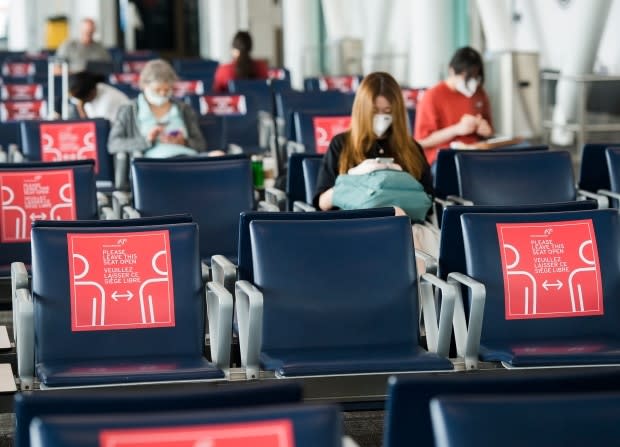Critics not on board with airlines' decision to relax in-flight physical distancing during COVID-19

The decision by Canada's two biggest airlines to relax on-board physical distancing policies next month is under fire from those who worry about the health implications of doing so amid the COVID-19 pandemic.
Air Canada and WestJet announced on Friday they would begin selling tickets for adjacent seats as of July 1, after blocking access to those seats for the past few months to allow passengers to maintain a safe distance from each other.
"We definitely feel like we've had the rug pulled out from underneath us," said Sarah Antonio, a Toronto resident with a ticket for a WestJet flight to Vancouver on July 8. "I just thought that they would want to take our safety more seriously."
Antonio said she and her husband are going on a business trip they were supposed to take in March but chose to delay because of the pandemic. She said the main reason they felt comfortable booking the flight now was because WestJet said explicitly during the ticket-booking process that the middle seat would be empty.

"We took some comfort in this option," she said. "Seeing that me and my husband are from the same household, we thought, 'Oh that's great. We're going to have a row to ourselves.'"
Antonio said she was upset when she found out that the middle seat could be filled from a tweet sent by her friend, not from the airline.
"You're selling us something that you're not providing," she said.
In a statement to CBC News, WestJet spokesperson Morgan Bell said the safety of its customers is a top priority and that the company's protocols are consistent with industry best practices.
"In the instance a guest is not comfortable on board, we suggest that they discuss seating arrangements with our crew, as they will continue to accommodate should there be space," Bell said. "In the rare instance a guest wants to disembark prior to the cabin door being closed, they would be provided with the opportunity to board the next available flight."
WATCH: Airlines face backlash by resuming to sell middle seats:
Physical distancing on flights
Relaxing physical distancing on flights by making every seat available for purchase is in line with recommendations from the International Air Transport Association (IATA), the trade organization for the world's major airlines.
The IATA says the need for physical distancing on flights is obviated by requirements for face coverings and the use of HEPA air filtration systems that are equivalent to those at hospital operating theatres. The IATA says these measures make the risk of passing on COVID-19 from one passenger to another very low.
The UN's International Civil Aviation Organization recommends airlines implement physical distancing measures between passengers and separate seating arrangements when occupancy allows it. The ICAO's guidance says that resuming higher volumes of passenger air travel will depend on public health agency guidelines and governmental restrictions, among other factors.
Both Air Canada and WestJet reverted to IATA's health recommendations, even though Transport Canada listed physical distancing among the "key points" in preventing the spread of the virus as part of a guide issued to the aviation industry in April.

"Operators should develop guidance for spacing passengers aboard aircraft when possible to optimize social distancing," the document states.
While that advice has not changed, a spokesperson for Transport Minister Marc Garneau said the on-board spacing requirement is a recommendation only and therefore not mandatory.
"Other considerations such as aircraft configuration, passenger needs and aviation safety must be taken into account when spacing passengers aboard an aircraft," communications director Amy Butcher said.
Canadian airlines have taken a number of steps beyond physical distancing on flights to prevent the spread of COVID-19.
They must conduct pre-boarding temperature checks and require masks on board for crew and passengers. They have also implemented enhanced aircraft cleaning and scaled back their in-flight service in late March, cutting out hot drinks, hot meals and fresh food.
Ottawa should make physical distancing mandatory: NDP
NDP MP Niki Ashton said the same physical distancing rules that apply throughout Canada should also apply on airplanes.
"This really speaks to the profit-driven agenda of the airlines," she said. "The Canadian government should be doing a lot more than encouraging or shrugging its shoulders."
Air Canada and WestJet are not alone in promoting the IATA recommendations against in-flight physical distancing.
Budget carrier Flair Airlines never adopted a no-middle-seat policy, CEO Jim Scott said in an interview.
"It was really easy to have space between passengers because, until two weeks ago, we didn't have any passengers," he said.
Scott said as more tickets have been booked in the past 14 days, the airline faced a choice: block off middle seats and raise all fares by up to 40 per cent or find another way. Flair chose to allow passengers who book flights in a specific section of a plane to pay a $49 fee to ensure the seat beside them remains vacant.
Other Canadian airlines, including Air Transat and Porter Airlines, have suspended flights until mid to late July. Air Transat said when it returns to flying on July 23, middle seats won't be blocked off.
"We will, however, to the best of our ability, apply distanced seating when possible ... [for example] when the load factor allows it," Air Transat spokesperson Christophe Hennebelle said.


